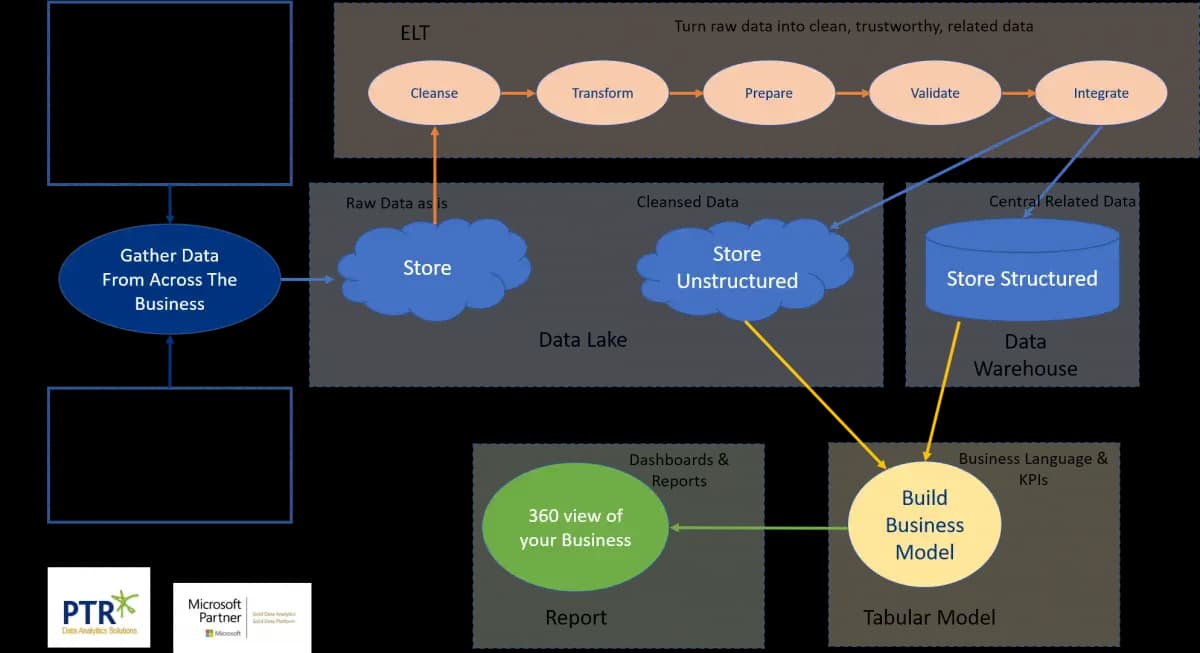Learning Path for BI Solutions Consultancy Services
Comprehensive Learning Path for Business Intelligence Solutions

What do I need to know?
The world of data and business intelligence is a wide, varied and exciting one. Figuring out what skills you and your team need to add to your repertoire can be challenging as there are so many different paths that you can follow when designing and implementing business intelligence and data analytics solutions. So where do we start? We could approach the learning journey by job role, or we could approach it by looking at the data journey behind a business intelligence solution. The data journey consists of many phases and each requires a specific set of skills that may be required to ensure you achieve the full potential of your data management and business intelligence requirement.

Speak with one of our data specialists
Every client requirement and starting point is different. We can help you work out what your training, mentoring and deployment support needs might be far more effectively if we speak to you. Our data specialists are here to assist you with not only planning, designing and implementing your business intelligence projects, but also to work with you to identify the needs of your team in terms of developing their current skill sets to be able to participate effectively in the implementation and support of your solutions. If you would prefer to have expert BI consultants at your side on your data journey then why not find out more about our Business Intelligence Consultancy services. Call us on 0118 979 4000 or email info@ptr.co.uk for an informal chat about how we might be able to help you. If for now you just want to get a better idea of what training, consultancy and support you may need then keep reading. We have listed some of the job roles and skillsets that are behind successful business intelligence and data analytics projects.
A Look at Your Data Journey
If we look at the data journey we can see that there are a number of clearly defined phases or stages of a business intelligence solution.

Gather Data
ELT
Data Lake
Data Warehouse
Business Model
Report
Typical Business Intelligence Job Roles
The following table lists typical job roles involved in this data journey along with the data journey stage they might be involved in and the skill sets they may require.
Job Role | Description | Data Journey Stage | Skills Required |
BI Project Manager | Ensures the overall success of the project delivery by coordinating the teams who build, develop, deploy, train and maintain. | Whole Journey | Project Management, Communication, BI & Business Requirement Awareness |
BI Solution Architect | Possesses in depth experience across all areas of business intelligence from data sources, ETL/ELT, data lakes, data warehouses, semantic models, cloud platforms and infrastructure, reporting and dashboard solutions. Collaborates with business stakeholder and IT teams to gather full requirements and plans and designs the overall solution architecture from end to end (data sources to dashboards). | Whole Journey | All aspects of data platforms, cloud platforms, networking, security, ETL/ELT, data warehouses, SQL, data lakes, data modelling, reporting & dashboard platforms, data science understanding, communication, business understanding |
BI Manager | Oversee the development of effective management information systems and associated reports and dashboards. | Reports & Dashboards | SQL, Power BI |
BI Architect | Designs the BI platform infrastructure such as data modelling, report and dashboard design, but does not generally get involved with the Data Warehouse, ETL/ELT side of things. | Business Model | Azure Analysis Services, PowerApps, Power BI, PowerQuery, DataFlows, Shared Datasets, Tabular Modelling, BI and Cloud Architecture Design |
BI Analyst / Business Analyst | Collaborates with business stakeholders to understand reporting and dashboard issues, challenges and requirements and liaises with BI developers to specify and develop dashboards and reports to satisfy stakeholder requirements. | Dashboards & Reports | Communication, Stakeholder Collaboration, BI Project Manager & BI Solution Architect Collaboration, Business Engagement, Understanding of Business Requirements |
BI Developer | Interprets business reporting requirements, develops ETL/ELT processes to gather and integrate all required datasets, develops and maintains data models and data structures, supports development of reports and dashboards. | ELT, Data Lake, Data Warehouse, Business Model | SQL, Data Warehouse Design, SSIS, Data Factory, Data Lake, Azure SSAS, PowerApps, Power BI, PowerQuery, DataFlows, Shared Datasets, Tabular Modelling |
BI Administrator | Manages the systems that support and host the business intelligence solution such as databases, ETL/ELT platforms, reporting platforms. | Whole Journey | ELT, Storage, Business Model, Reporting Platforms Administration |
BI Consultant | Supports the architects, analysts, developers, administrators and engineers from a wealth of experience that spans the whole BI spectrum and can provide a top view to assist with implementing best practice, optimum performance, trustworthy and secure solutions that are fit for purpose, futureproof and fit with an organisation's overall data strategy. | Whole Journey | All or any of data platforms, cloud platforms, networking, ETL/ELT, data warehouses, data lakes, data modeilling, reporting & dashboard platforms, data science understanding |
Data Strategist | Possesses an in-depth analytical and technical knowledge combined with an ability to understand business requirements. Has excellent communication skills as well as technical skills and interacts with people from across the business. Gains a full understanding of an organisation's data storage & business intelligence needs, data estate, data compliance and business goals, and translates these into data-driven initiatives and in turn designs a future-proof data strategy and roadmap for an organisation. | Whole Journey | Data Compliance, Data Management, Data Governance, Data Quality, Data Drriven Decision Making, BI & Data Science, Data Architecture |
Data Architect | Provides technical expertise in analysis, design, development, rollout and maintenance of data integration (ETL/ELT), data warehouse and business intelligence solutions to architect, design and develop data analytics solutions with the best fit infrastructure, tools and processes. | ELT, Data Lake, Data Warehouse | Data Lake, Data Warehouse, SQL, Tabular Modelling, DevOps, Data Architecture & Design. |
Data Engineer | Possesses expertise in areas such as data warehouses, data modelling, ETL/ELT, Big data, data lakes and is responsible for identifying trends in data sets and developing algorithms to make raw data more accessible and translated into useful formats for analysis. | ELT, Data Lake, Data Warehouse, Business Model, Machine Learning. | Data Lake, Data Warehouse, SQL, Tabular Modelling, DevOps, ML, AI, Python, R, Mathematics. |
Data Analyst | Analyses datasets to identify trends and insights that can be used to drive business decisions. | Dashboards & Reports | Power BI, SQL |
Data Scientist | Solving complex business problems and spotting trends, often from large "big data" sources, with data driven techniques and using their mathematical expertise and programming language skills (such as R and Python) combined with an ability to understand and interpret business functions and requirements. | Machine Learning | ML, AI, Python, R, Mathematics, Communication, Understanding of Business Requirements. |
Data Mentor / Educator | Educates, coaches, mentors and trains team members and business users to get the best out of the business intelligence solutions. | Whole Journey | All skills across the data journey, teaching, coaching and instructing skills, Communication, Understanding of Business Requirements, Interact with all staff levels from stakeholder engagement, management overview, users and administrators. |
Data Warehouse Designer / Developer | Plans, designs and builds a data warehouse. Works with Data Engineers to extract data from the data warehouse as part of ETL/ELT operations. Builds views and stored procedure to extract data from the data warehouse to pass on to business intelligence tiers. | Data Warehouse | SSIS, Data Factory, SQL, TSQL, Data Warehouse Design, Data Warehouse Query Performance Monitoring & Optimisation. |
Database Administrator (DBA) | Manages the day to day security, performance, backups of database platforms. Monitors performance and tunes database instances to ensure optimum response times. Manages scalability. | Data Warehouse | SQL, Azure SQL Administration, Azure Data Warehouse Administration, Azure Portal Usage. |
Share This Post
Frequently Asked Questions
Couldn’t find the answer you were looking for? Feel free to reach out to us! Our team of experts is here to help.
Contact Us